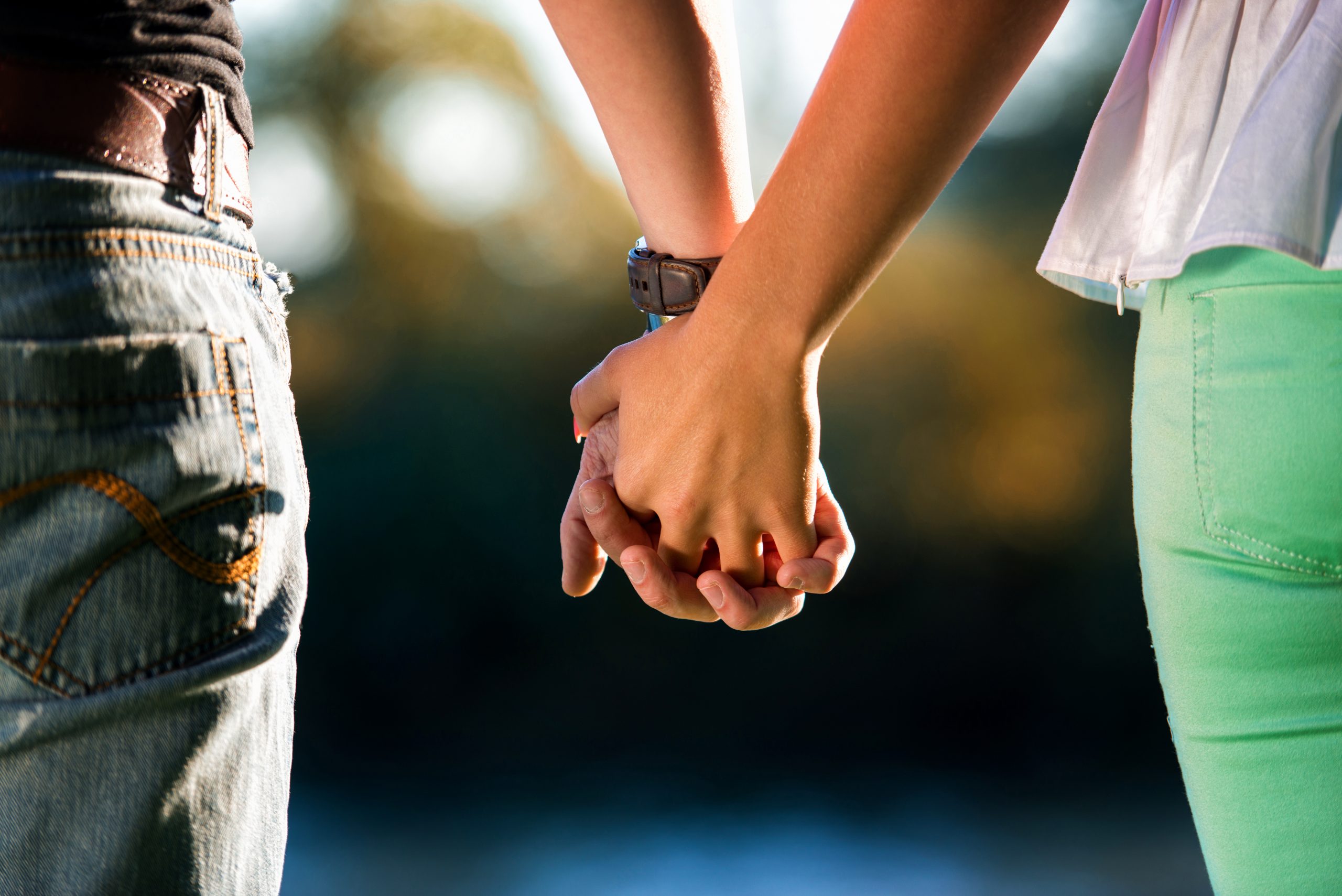“I was nervous to tackle traditional dating but I wanted to find someone I could unmask with, who heard what I really had to say”
Guest blogger Kit considers the challenges and rewards of dating as a neurodivergent person in a neurotypical world. Please note, this article covers adult topics.

“As someone who’s recently been stepping back into the dating scene fresh after failed relationship after failed relationship with an autism diagnosis and PTSD from past trauma, I was nervous to tackle traditional dating. The idea of going to meet with essentially a stranger was terrifying. Also I hated the idea of scrolling aimlessly picture after picture and trying to judge someone’s level of attractiveness just from an image and some silly humbling sentences.
As a queer woman who identifies as panromantic (someone who is attracted to all genders) and demisexual (only feels sexual attraction once an emotional connection is formed) topics such as sex made me nervous. Being in situations where I was vulnerable, I wasn’t sure how to tackle these issues with a potential partner should I be successful in finding someone. But I knew I had to be clear on boundaries. I clearly stated my autism diagnosis, as well as the fact that if they couldn’t respect my neurodivergence, then to not bother with messaging. Blunt? Yes. But I had to be. I wanted to make it clear I will not have boundaries disrespected or waste time with someone had an uneducated view on autism. I hoped to only find people who were informed and forward thinking beyond the stereotypes.
I’m someone who likes to be challenged. I wanted someone who could hear what I’m saying, as well as being challenged in engaging ways. So I treaded the waters of Bumble. I was honest on my profile, no matter how cringey a typical person would see me. Sharing my love of Korean pop music and my regular gaming habits and café visits.
I would search through anyone who even was remotely interesting and I hated it. Scrolling image after image, boring profile after boring profile. Same image, different people. All very much the typical heteronormative individual with the most boring fashion sense and descriptions as plain as buttered bread with no filling. I had some messages but nothing reached to me. Either typical questioning of ‘what was I doing’ or ‘how was I’ was as engaging as it got. As you know, autistic people tend to have a distain for small talk.
So, in all reality I was ready to give up. Feeling quite insecure of myself and whether anyone felt this way about me, I judged other people visually. I was ready to uninstall and accept a life of living alone with a cat or two, with my Ateez collector bookshelf standing tall with every version of their most recent comeback. But in June 2023, I found someone who was really up my alley. A demisexual gamer (like myself), a love of cats and even two of his own, well dressed, engaging. So, I took the plunge and sent a request, and to my surprise he liked me too. Our talks were great, there wasn’t any cheesy small talk, we started engaging confidently almost right away. If anything, he had questions and wanted to know more about my condition prior to our first date so he knew what he needed to do to make me comfortable. Which was a first, I’ve never having any romantic partner be considerate of my condition before. It was almost scary.
Our first date was the cat café before we went to the cinema. The date was relaxed, he was so easy to get on with and he enjoyed my info dump rambles on random information I deemed interesting enough to share, even called it cute.
As of writing this article we have been seeing each other for four months. It’s been amazing. Dating can be amazing as long as you’re safe, supported and cared for. As nerve wracking as it can be, it’s great when you find someone who is on your wave length.
Here’s what I’ve learnt on my dating journey and through my own research.
Building your self confidence
Dating as a neurodivergent person can be challenging, due to the social barriers and dating ‘rules’ associated with romance that some neurodivergent people may struggle to understand. Even if you feel comfortable going against the grain and a heteronormative society, dating can be complicated.
As a result, many feel unsure how to tackle dating if they choose to get involved in the dynamics of love and romance.
Stereotypes, including those that have historically been perpetuated by the media, contribute to the challenges associated with neurodivergent people and dating. For example, stereotypes that suggest neurodivergent people may lack independence or are childlike have resulted in some neurodivergent people feeling insecure and lacking in self-confidence that they are indeed worthy of love.
But as a collective, we should be looking at dating as a way to enhance our lives, especially as neurodivergent folk. To find someone you can feel comfortable around and maybe even get to unmask and live your most authentic life with can be so valuable – someone by your side who you can share experiences with, whether that significant other is neurodivergent or not.
The issues being brought to light
Neurodivergent people may struggle to read between the lines, which means they can be vulnerable to gaslighting and other types of manipulative behaviour. They’re also prone to intense connections and can leave themselves open to exploitation and other nasty behaviour. While difficult to talk about, it’s essential that neurodivergent people are not left out of the conversation, especially around consent and what to look out for when worrying about manipulative relationships.
For example, studies have shown that autistic people may be up to three times as likely as their neurotypical counterparts to experience bullying, and physical or sexual abuse. Autistic people are sometimes seen as people who are not sexually active or don’t need educating on anything to do with consent – but it’s the opposite. As a vulnerable group, it’s important we have up-to-date education on these issues.
For a very long time it was assumed that many neurodivergent people did not ‘do’ love, relationships or even sex, so therefore the education provided was never enhanced or considered in a different way compared to the neurotypical experience.
Christine McGuiness’s BBC documentary ‘Unmasking My Autism’ shed light on the topic of romance as she discusses her separation from her partner, as well as traumatic past experiences she dealt with in previous relationships. Christine reflects on her autism diagnosis and how it may have affected the issues she faced, underlining why these topics need to be investigated and talked about more openly with neurodivergent people especially.
Neurodivergent people can sometimes also struggle with mental health problems, and may be dealing with situations where they feel compelled to shut down and not talk about their issues openly, and this can feed into every aspect of their life, including romantic relationships.
Communication is key
In relationships, communication is so important. Communication matters in any situation for everyone, whoever you are, but neurodivergent people can operate very differently, so it is worth creating boundaries and expectations early on.
Many can feel nervous or insecure at the start of a blooming relationship so the sooner this can be established, the healthier the relationship will grow. Neurodivergent individuals are more likely to identify as LGBTQ+ than their neurotypical peers – maybe in part due to going against the norm, and that includes in love life (read our article about being neurodivergent and LGBTQ+). They can also feel very strongly, love can be an intense emotion, creating certain expectations that if not filled can leave someone feeling undesired or unwanted.
Everyone who is neurodivergent has different boundaries and things that they enjoy when it comes to dating. For example, some enjoy physical touch, some don’t. Knowing these boundaries ahead of the time is essential. It’s important that you communicate these issues. This can include locations that you prefer to go to because they utilise less spoons (or less energy). Discussing this ahead of time will save you from any discomfort on the actual date. If these concerns are not seen as viable then you know it’s best not to go ahead. If someone isn’t respecting your rules and boundaries ahead of time then you know it’s really not meant to be and an uncomfortable situation can be avoided.
It’s important you are supported and allowed to be your most authentic self. Being able to be unmasked, gauge in special interests and be supported during periods of low spoons and moods is incredibly valuable.
Safer steps to make connections
Dating and romance should be exciting. Apps like ‘Hiki’ provide a supportive environment for autistic individuals to meet other autistic individuals and make connections, both friendly and romantic. One element of dating that can be overwhelming is the worry of explaining a disability or neurodivergent condition to someone else, but Hiki takes this away by connecting you with other neurodivergent individuals in the first way.
Dating and romance should be seen as a fun extra and it’s important to consider that your personal happiness is what should come first – and if that doesn’t include a relationship, that’s cool too.
Article and references
- Opposing Forces? Autism and Dating, Romance, and Sexuality in the Mainstream Media – Canadian Journal of Disability Studies
- Neuroqueer Intimacies in Online Dating Apps – Journal of Arts & Humanities
- Why are autistic women more likely to be victims of sexual abuse and violence? – Glamour UK
- The sexual health, orientation, and activity of autistic adolescents and adults – Wiley Online Library
- The Link Between Neurodiversity and the LGBTQIA+ Community – Learnfully

